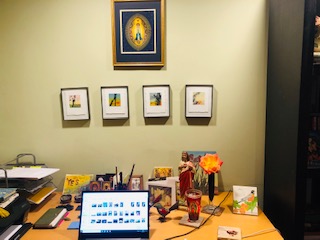“Go into all the world and preach the gospel to the whole creation.” — Mark 16:15
Until a month ago I had never so much as engaged in a FaceTime call, much less entered the realm of Skype or Zoom. Eccch, was my thought. I don’t want to see people when I’m talking to them on the phone. I don’t want to communicate sitting in front of my laptop by way of a grainy video.
But like much of the rest of the world, I discovered very quickly after the quarantine was imposed that Zoom meetings of various kinds were a godsend.
Next came the phenomenon of the livestream Mass, the very thought of which, again, a month ago would have made my skin crawl.
Then every church in the archdiocese closed up tight. A few days later, I came to see the livestream Mass as a beautiful gift, a welcome and essential balm.
Meanwhile, I learned how to participate in a Zoom meeting and I learned the rudiments of hosting one. I also continued to post on the blog I’ve maintained for 10 years.
One morning in prayer the thought came: I wonder if my blog readers would be interested in a little Lenten reflection Zoom gathering?
Many other thoughts, believe me, instantly arose. No one will show up. Crazy people will show up. People will ramble on for too long. People won’t like me once they see how I really am. We’ll all feel too awkward to say anything. I’ll be tired and crabby that day, the wifi reception will be bad, the whole effort will be a debacle.
But one fringe benefit of the quarantine, I’ve found, has been an increased willingness to throw caution to the winds. So I posed the idea, sent out the Zoom link and, in mingled excitement and trepidation, waited.
A few emailed in advance and said, “I’d love to come but I’m not Catholic.” I replied, “Of course, come! Of course you don’t have to be Catholic!”
The day arrived, the wifi cooperated, and the gathering was easy and beautiful. Some of us were Catholic and my guess is some weren’t. No one asked; no one cared.
Among others we had a priest from Kansas, an event planner from County Kerry, Ireland, a Camino walker from Croatia, a young husband and father in Florida who has a prison ministry, a woman from Germany who’d stayed up late to join and spoke of praying during Lent for all the people around the world who must fast from the Eucharist pretty much all the time.
I’ve always wished the Church had more of this: small groups where, guided by the Gospels, we feel free simply to say where we are, “I love my kids but I'm ready at the moment to kill them”; “My mother-in-law is coming for a week — St. Michael the Archangel, pray for us”; “I’m full of self-pity and I can't find God anywhere”; “I just lost half my IRA but I’m also weirdly grateful.”
Afterward, I reflected about how that is the best kind of “evangelization.” Not pushing someone to buy a 12-CD set and a fancy Bible; rather, just sitting around talking and inviting people to share, in an uncontrived and unselfconscious way, how faith permeates and guides our lives, like yeast all through the loaf.
The first meeting more than 20 people showed up. Several more asked to be put on the list. By the time I sent the second invitation out, the recipients had grown to more than 40.
Eleven or 12 came.
That the group shrank rather than grew was, in retrospect, quite funny.
Afterward, I realized I’d been expecting a groundswell. Inwardly, I’d been ever so slightly preening. Always, like Peter at the Transfiguration, I want to build a booth and start a carnival, with myself as lead barker.
The fact is that those two gatherings were a highlight of my Holy Week and Easter. The people who donated their time and hearts were ministering to me, not the other way around.
Christ says, “For where two or three are gathered together in my name, there am I in the midst of them” (Matthew 18:20).
We tend to think he means two or three, and up. But maybe he means two or three, period. Maybe he means that in a very small intimate group is where we’re most likely to find him, and to feel him.
In “The Long Loneliness,” Servant of God Dorothy Day wrote:
“We cannot love God unless we love each other, and to love we must know each other. We know him in the breaking of bread, and we are not alone any more. Heaven is a banquet and life is a banquet, too, even with a crust, where there is companionship.
“We have all known the long loneliness and we have learned that the only solution is love and that love comes with community.
“It all happened while we sat there talking, and it is still going on.”

